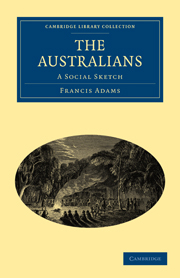APPENDIX
Published online by Cambridge University Press: 07 October 2011
Summary
APPENDIX A
The rival manifestoes of Sir Samuel Griffith and Sir Thomas M'Ilwraith, the leaders of the local Liberal and Tory parties at the Queensland General Elections of 1888, are of more than ephemeral interest. They will give Englishmen some idea of what Liberalism and Conservatism mean — or rather, profess to mean—in Australia.
SIR SAMUEL GRIFFITH'S MANIFESTO
TO THE ELECTORS OF NORTH BRISBANE
Gentlemen,—You will shortly be called upon to elect two members to represent you in a new Parliament. It is my intention to submit myself again as a candidate for your suffrages, and I take this early opportunity of addressing you upon the present position of public affairs.
The two great questions especially before the country at the last general election were, as you are aware, the proposed introduction of Coolies from British India, and the construction of Railways on the Land-grant principle. On both questions the constituencies spoke out plainly, and the statutes under which the Colony was liable to be inundated with Asiatics, or handed over to the mercies of non-resident monopolists, have since been repealed.
I wish we could believe that the dangers themselves, the imminence of which was much greater than is generally supposed, had completely passed away.
The Liberal Party has no need to be ashamed of the work that has been done in the last four years. The programme put forward by its leaders has been consistently followed, and our efforts have been to a great extent successful.
- Type
- Chapter
- Information
- The AustraliansA Social Sketch, pp. 279 - 314Publisher: Cambridge University PressPrint publication year: 2011First published in: 1893



